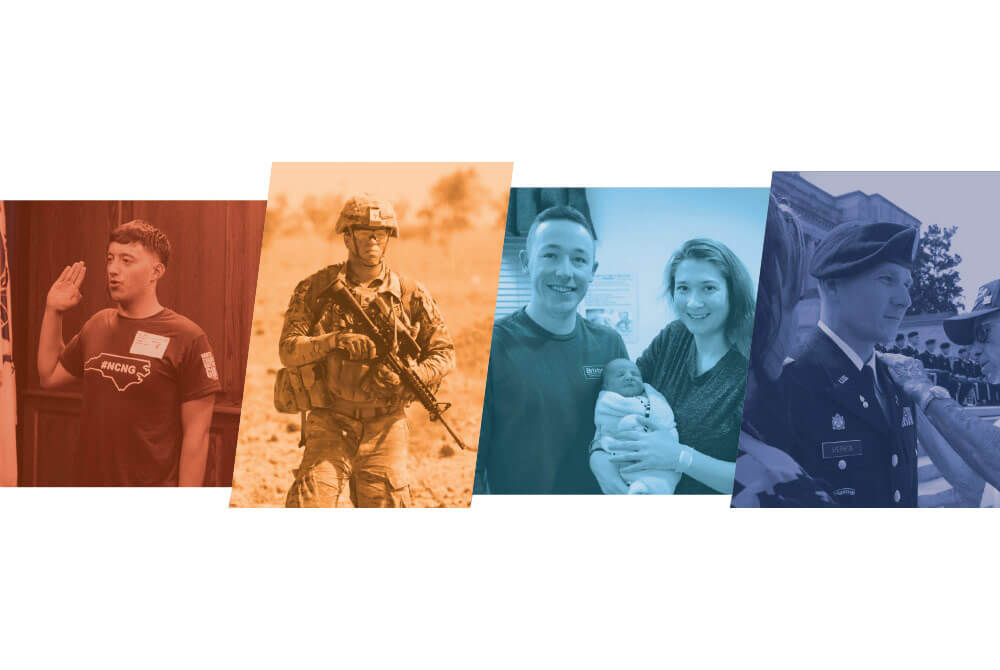National Guard Soldiers Offer Insight to Mental Wellness Counselors
When the Military and Government Counseling Association of North Carolina (MGCANC) reached out to the North Carolina Army National Guard, the Army National Guard reached right back. Leaders at the association had a novel idea: counselors should learn how to counsel Soldiers from the Soldiers themselves.
The MGCANC hosted a panel discussion in early February consisting of North Carolina Guard Soldiers who provided their perspectives on hypothetical case studies of Soldiers dealing with a variety of diagnoses. The event brought together licensed counselors and graduate students from across the State in hopes that they might glean some insight into the best approach for addressing the mental health concerns many Soldiers face.
The counselors, having a sincere wish to bridge the disconnect Soldier-patients often feel when trying to relate to a civilian therapist who has little or no knowledge of the military, listened attentively to the Soldiers.
“The [Soldiers] who sat on the panel were knowledgeable,” explained SGT Shaun McNerny, a military police officer from the 514th Military Police Company, and member of the panel. “Three out of the five of us were combat vets. As far as the counselors who sat in the audience … everyone there had a desire to understand what we were going through or how to meet veterans’ needs. They just wanted to ask questions on what we had gone through – reintegration or mental health for veterans.”
Dr. Seth Hayden is an associate professor of counseling at Wake Forest University. He and colleague Dr. Jane McNeil formed MGCANC in 2016 to function as a conduit between mental health professionals, military and government service members and their Families.
“I think a big part of it is raising awareness [about] the unique context people in the military are operating in. Counselors must understand and realize that there are some potential barriers to someone experiencing mental health challenges seeking services,” Hayden said.
According to Hayden, one of those barriers is stigma. A mental health diagnosis is something no one wants – perhaps even more so for Soldiers because it can be seen as a risk while in combat. Thankfully, in today’s society a diagnosis is just a first step in getting necessary treatment. The Army National Guard is committed to its duty to help heal Soldiers suffering from any kind of combat-related injury. For a Soldier with a strong commitment to wellness, mentally oriented injuries are just another challenge to be overcome with the right help.
SGT McNerny is one who has accepted his challenges head on, and he encourages other Soldiers to do the same. He believes the stigma is not caused by your state of mental wellness, but how you react to changes in your health once faced with them.
“At a certain point when you feel it’s just too much, in any respect, you should absolutely look to your left, to your right — look to anybody and ask for help,” he said. “I don’t care if it’s a supervisor or a buddy standing in a fighting hole next to you because there’s always going to be some sort of [mental] battle, whether it’s bills, Family, combat or a mission gone bad. The stigma is not whether or not you have an issue; it’s how you address that issue.”
Many Soldiers believe that if a member of a tight-knit unit needs to address mental wellness, it will be perceived negatively by their peers or even unit leaders. Feeling as though seeking help will damage one’s military career or image would certainly deter many Soldiers from reaching out for proper support.
SGT McNerny believes that is the wrong attitude.
“Some people just keep it [to themselves] and then they blow up and commit domestic violence, or they commit a crime of some sort, or they unfortunately take their own life. That’s where the stigma actually comes from [when other people see the actions that result from not getting help early on].”
When the sergeant was faced with his own obstacles to overcome, he confronted them at the ground level. Desiring first-hand expertise on what he was going through, SGT McNerny went to college and got a bachelor’s degree in psychology and then a master’s in forensic psychology, he said.
“Now when people are talking about mental health, I am informed,” noted SGT McNerny. “I can give my own two cents on the matter when asked.”
That is exactly what he did at the MGCANC forum – gave his two cents, which happened to be invaluable insight about the challenges Guard Soldiers encounter. His perspective supports a nontraditional approach in counseling Soldiers.
“When someone says ‘treatment,’ a lot of people automatically think lab coats and counselors, and you’ve got to go talk about your feelings. It’s not like that. You can address it in several different ways. I’ve seen veterans just get together, have a beer and talk stuff out,” said SGT McNerny.
He cited one well-known Afghan vet who uses a horse ranch in Texas to offer Soldiers equine therapy. Other therapies offered are self-directed training of service dogs, yoga and meditation, various outdoor therapies, art collectives, sweat lodges and many more options.
The reality is, when Soldiers come back from a deployment, they may find they face unexpected changes in their mental or Family wellness. Some Soldiers may be tempted to go it alone when things get tough, but that is typically the wrong strategy. Those in Army National Guard leadership are ready to help, but they cannot read minds.
“How can we fix something if we don’t know it’s broken?” questioned SGT McNerny.
Just like one might need a boost from a teammate over an obstacle on a training course, a boost may be needed in other areas of life. There is no shame in getting a lift up – only in rejecting the helping hand.
According to the MGCANC panel discussion organizers, the event was a success. They received positive feedback from both counselors and Guard Soldiers – so much so that they plan to continue holding similar panels and hope to create smaller versions that would be held at the community level.
SGT McNerny summarized it all by simply stating, “Sometimes you need to step back and say, ‘OK, I’m only human. I need to address this issue.’”
If you think you might need help with your Family or mental wellness, call the confidential Military Crisis Line at 1-800-273-8255 and press 1, or text 838255.
By Staff Writer Matthew Liptak



